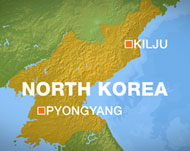N Korea resolution risks Chinese ire
The US has introduced a new version of its UN draft resolution to punish North Korea for its reported nuclear test, but the wording is expected to encounter opposition from China.

The draft comes amid growing speculation that North Korea’s test on Monday was, in fact, not nuclear.
The resolution adds a travel ban but softens language on cargo inspections and financial sanctions to try to get Russian and Chinese support.
The draft also does not include Japanese demands to prohibit North Korean ships from entering any port or North Korean aircraft from taking off or landing in any country.
John Bolton, the US ambassador to the UN, intends to introduce the resolution on Thursday to the 15 UN security council members in the hope of a vote on Friday. But China is expected to insist on further negotiations, diplomats say.
On Wednesday, President George Bush said he was working with other states to ensure “serious repercussions” for Pyongyang, while Japan announced its own new bilateral sanctions. And North Korea held out the threat of more tests, saying US pressure to rein in its nuclear programme would be tantamount to a “declaration of war”.
In Beijing, China said it had sent envoy Tang Jiaxuan, a state councillor and former foreign minister, to Washington with a stop in Moscow, in the latest flurry of diplomacy, the Xinhau news agency reported.
Claim questioned
In a related development, South Korea said on Thursday that it had detected no abnormal radioactivity levels in its country.
Lee Moon-ki, the director-general for nuclear energy at South Korea’s South Korea’s science and technology ministry, had earlier said his country had also detected no increase in radioactivity at the suspected test site in North Korea. But he later retracted that statement, saying he misspoke.
Both his ministry and the government-affiliated Korea Institute of Nuclear Safety announced on Thursday that tests of air samples in South Korea since Monday’s declared nuclear test by the North have shown no signs of increased radiation.
“So far, we have not detected any abnormal level of radioactivity,” said Han Seung-jae, an official at the nuclear safety institute.
Han said that the finding did not indicate that the North did not conduct a nuclear test or that a test may have failed.
Arms embargo
The UN draft resolution also calls for an arms embargo, a ban on any transfer or development of weapons of mass destruction as well as a ban on luxury goods. It would freeze funds overseas of people or businesses connected with North Korea’s nuclear and ballistic missile programmes.
And it adds a proposal by Japan that would allow, but not require, states to bar the entry of individuals and their families connected or supporting the North’s polices on weapons of mass destruction.
 |
|
Kilju was the site of the claimed |
The new US draft still invokes Chapter 7 of the UN Charter, and determines that North Korea’s actions are a threat to international peace and security.
Wang Guangya, the Chinese UN ambassador, said Beijing wanted to restrict the reference to Chapter 7 to Article 41, which would authorise only a narrow list of sanctions to ensure no military action could be inferred.
Still, experts have been unable so far to confirm that the earth tremor detected on Monday was indeed a nuclear test, as announced by North Korea.
The new bilateral sanctions announced by Japan, underpinning those imposed after Pyongyang test-fired missiles on July 4, included barring all North Korean ships from Japanese ports and banning imports.
New consensus
In Washington, Bush said he saw a consensus emerging among the world’s major powers that it was vital to act now. China and Russia, North Korea’s main trading partners, have been more tolerant of Pyongyang in the past.
He said: “In response to North Korea’s actions, we are working with our partners in the region and the United Nations Security Council to ensure there are serious repercussions for the regime in Pyongyang.
|
“The world has made it clear that these tests caused us to come together and work in the United Nations to send a clear message to the North Korean regime” George Bush, |
“The world has made it clear that these tests caused us to come together and work in the United Nations to send a clear message to the North Korean regime.”
Bush said he was committed to diplomacy and repeated assurances the US had no intention of attacking North Korea. But he rejected demands he engage directly with North Korea on a bilateral basis, as Pyongyang wants, saying that approach had failed in the past.
Kofi Annan, the UN secretary-general, for the first time urged such bilateral talks, on Wednesday, saying: “I’ve always argued that we should talk to parties whose behaviour we want to change, whose behaviour we want to influence.”
Korean statement
In the capital of North Korea, a tightly regimented country with a 1.2 million-strong army, the country’s second in command said whether Pyongyang conducted more tests depended on Washington.
“The issue of future nuclear tests is linked to US policy towards our country,” Kyodo news agency quoted Kim Yong-nam as saying in a meeting with a Kyodo delegation on Wednesday.
Pyongyang’s KCNA news agency quoted a foreign ministry spokesman as saying: “If the US increases pressure upon the DPRK (North Korea), persistently doing harm to it, it will continue to take physical countermeasures, considering it as a declaration of a war.”
It said North Korea was ready for both dialogue and confrontation.